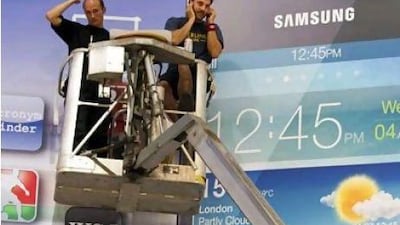A Fourth-generation (4G) telecommunications services are about to transform mobile communications across the Middle East.
Saudi Arabia this month launched three separate 4G services and the operators Etisalat and du in the UAE are poised to do the same.
Although consumers are largely unfamiliar with the new technology, it is expected to cause a major shake-up among the region's mobile operators as they try to woo new and existing customers with high-speed video services.
These enable mobile phone users to view video websites such as YouTube and to access the increasingly large volume of home-made video content on the social networking site Facebook.
However, the term 4G covers a number of conflicting technologies and generally only those working in the industry fully understand it.
"The precise definition of 4G really depends on who you ask today," says Steven Hartley, a principal analyst at the international research company Ovum. "There are two competing technologies that have a strong claim to the name 4G now: Long Term Evolution [LTE] and mobile WiMAX [local high-speed wireless networks]."
Experience in the US illustrates how the term 4G, far from being a scientific label, has rapidly become a marketing brand.
"In the US Clearwire currently uses mobile WiMAX, while Verizon Wireless uses LTE. However, there is now an interesting situation in the US where T-Mobile is being disruptive and is aggressively marketing its HSPA network [an upgrade to 3G], offering speeds of 21 megabytes per second, as 4G," says Mr Hartley.
"In December 2010 the International Telecommunication Union, which defines the standards, announced that high-speed HSPA networks could be marketed as 4G, muddying the technical waters even further."
What all the technologies lumped together under the 4G umbrella have in common is the supply of very fast data speeds - several times current levels - to mobile devices.
While the main marketing thrust of 4G is aimed at mobile phone users, there is evidence that in markets such as the Middle East, 4G may have an ever greater relevance for other wireless devices. Mobile operators across the world now supply small USB sticks, known as "dongles", that plug into the sides of laptop computers to supply mobile broadband internet access. These are ripe for increased bandwidth.
"Of course, 4G will not only power a new generation of smart phones, it will also provide a faster data pipe for tablet computer users and for dongles. This produces a very interesting situation for mobile network operators in emerging markets such as the UAE," says Mr Hartley.
The 4G technology effectively offers a low-cost alternative to traditional high-speed data networks that rely on a fixed-line cable to deliver the service.
"If they wish to provide high-speed internet connections to a wide area, they now have a choice between digging up the roads to install fibre [optic cables] or simply erecting an LTE cell tower," says Mr Hartley.
But he says such cell towers can continue to perform well only if the number of customers using the service simultaneously to access high speed services such as high-definition television (HDTV) is controlled. For this reason, operators in the Middle East need to carry out detailed customer research.
"Effective customer segmentation is now all-important for mobile operators in countries such as the UAE as it dictates how much operators will need to invest, in what technologies, when," says Mr Hartley.
The race is now on to deploy 4G across the Middle East with early adoption in Saudi Arabia set to be followed in the UAE.
"With a parallel launch of Long Term Evolution services in Saudi Arabia, by Mobily and Saudi Telecom Company, the intense data race has become even more evident with a clear agenda to maximise market share and gain early leadership," says Vivek Malhotra, an analyst at the research company Frost & Sullivan.
"Operators such as Etisalat may now be forced to follow suit to provide consumers in Abu Dhabi and Dubai the same level of service now being introduced in Saudi Arabia," says Mr Hartley.
But analysts believe the road to 4G is fraught with hazards for mobile telecoms operators such as Etisalat and du.
"This is a very dangerous time for operators as … if they fail to make the capital expenditure needed to upgrade their networks and supply new LTE-enabled smart phones in time," says Mr Hartley.
There is also the future possibility of users being offered incredible 4G deals as competing network operators try to attract one another's consumers.
"Competitors can also decide what price to charge," says Mr Hartley. "In Sweden … mobile operators offering 4G charge double the price, whereas other markets such as the US charge more or less the same as 3G. It is all a question of what people want and what they are prepared to pay."
However, increased competition among 4G mobile networks can only benefit ordinary consumers across the Middle East as operators start to offer new mobile video services at bargain prices.

